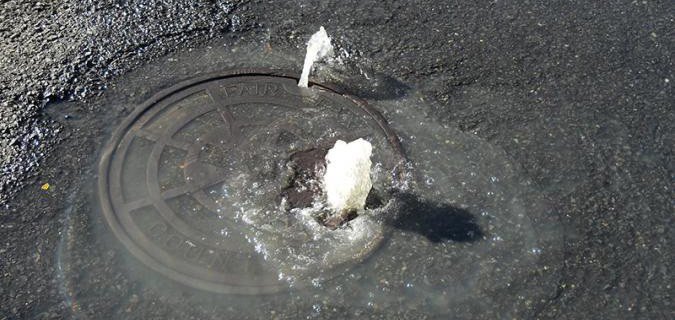Public Works and Environmental Services Alert:

Call the 24-hour Customer Communications Center (CCC): 703-323-1211 | TTY 711.
Check your insurance policy to determine if damages related to sewage backups or water damages are covered. This type of coverage may be an optional coverage and can generally be added to a policy if requested. The cost for this optional coverage is inexpensive, and it is advised that property owners with below grade fixtures investigate this coverage.
At the first sign of malfunctioning or damaged sewer lines, call the 24-Hour Customer Communications Center (CCC) at 703-323-1211 | TTY 711. A Trouble Response inspector from the Wastewater Collection Division will inspect the county sewer.
Report a sanitary sewer overflow – raw untreated sewage that discharges from the sanitary sewer system – to the 24-hour Customer Communications Center (CCC) at 703-323-1211 | TTY 711. Avoid contact with overflow discharges, and make sure that people are kept away from the area of overflow, especially children.
Overflows pose a substantial health risk as raw sewage can carry bacteria, viruses, molds and fungi. Sanitary sewer overflows can also cause poor water quality in lakes, rivers, streams, and pollute groundwater, and they can cause economic damage by hurting water-dependent businesses such as fishing and tourism.
Typical signs of an overflow include:
Contact the 24-hour Customer Communications Center (CCC) at 703-323-1211 | TTY 711, immediately.
To prevent odors:
A cave-in or sinkhole is a depression in the roadway which may be above a county sanitary sewer line. Report cave-ins/sinkholes to the 24-hour Customer Communications Center (CCC) at 703-323-1211 | TTY 711.
Miss Utility of Virginia® is the free “one call” Virginia information exchange center for excavators, contractors, and property owners planning any kind of excavation or digging. The Miss Utility center notifies participating utilities of the upcoming excavation work so they can locate and mark their underground facilities in advance to prevent possible damage to underground utility lines, injury, property damage, and service outages.
The Wastewater Collection Division’s Miss Utility section is responsible for locating and marking Fairfax County-owned and operated sanitary sewer-main lines in accordance with the Virginia Underground Utility Damage Prevention Act. The staff reviews, researches and processes over 180,000 locate requests annually. Please note, the Wastewater Collection Division is responsible for marking Fairfax County sanitary sewer-main lines and has no responsibility for marking storm sewer lines.
Fairfax County does not locate and/or mark private sanitary sewer laterals that extend from the building to the Fairfax County sanitary sewer-main line. Please refer to Fairfax County Public Facilities Manual, Chapter 10-0104.5A (7), Sewage and Solid Waste Disposal; and Fairfax County Code, Section 65-6-5, Ownership of Building Sewer, for further details.
Call Miss Utility at 1-800-552-7001 or 811, TTY 711, or visit the Miss Utility® website for more information.
Contact 24-hour Customer Communications Center (CCC) at 703-323-1211 | TTY 711, if you experience a problem with a grinder pump.
Low pressure sewer systems use grinder pumps to grind the sewage from your home (much like a garbage disposal in your kitchen) and pump the sewage through small pipes to the Wastewater Collection System. Low pressure systems are sometimes used in areas which cannot be served by gravity pipes.
The grinder pump can handle any wastewater that is normally discharged to the sewer from the kitchen, bathroom or laundry. Some chemicals and materials may cause operating problems or safety hazards.
Never put any of the following materials into sinks, toilets or drains:
These materials can damage the grinder pump, cause blockages or may create hazardous conditions in your home.
For more information, visit Grinder and Ejector Pumps

GET HELP NOW!
24-Hour Customer Communications Center (CCC): 703-323-1211 | TTY 711
Sanitary Sewer:
Wastewater is conveyed to one of six regional treatment facilities through several service agreements. Fairfax County’s wastewater treatment plant treats about 40 percent of the wastewater flowing through the system each day.
Our advanced wastewater treatment plant treats approximately 40 million gallons of wastewater every day. The effluent, or discharged treated water, consistently meets strict federal and state water quality requirements.
Take a virtual tour of the Noman M. Cole, Jr. Water Recycling Facility. See how wastewater from homes and businesses is cleaned at the Noman M. Cole, Jr. Water Recycling Facility.
Wastewater follows a different path than stormwater runoff, which flows directly into nearby waterways. A separate network of underground pipes conveys used water from homes and businesses to wastewater treatment plants. The treated water is then released into a nearby waterway.
View the various treatment processes used at the Noman M. Cole, Jr. Water Recycling Facility and how each step helps move our water one step closer to final treated wastewater that can be returned to local rivers and streams.
The Gunston Cove study has proven to be an extremely valuable case study in ecosystem recovery for the Chesapeake Bay region and internationally.
The Sewer Certification Report, prepared in accordance with Fairfax County's bond resolution, confirms that the Fairfax County Wastewater Management Program is satisfactorily operating and maintaining the County's wastewater system and the Program's budget is sufficient to meet operational, maintenance, debt service and capital "Pay-as-You-Go" (PAYGO) funding needs.
